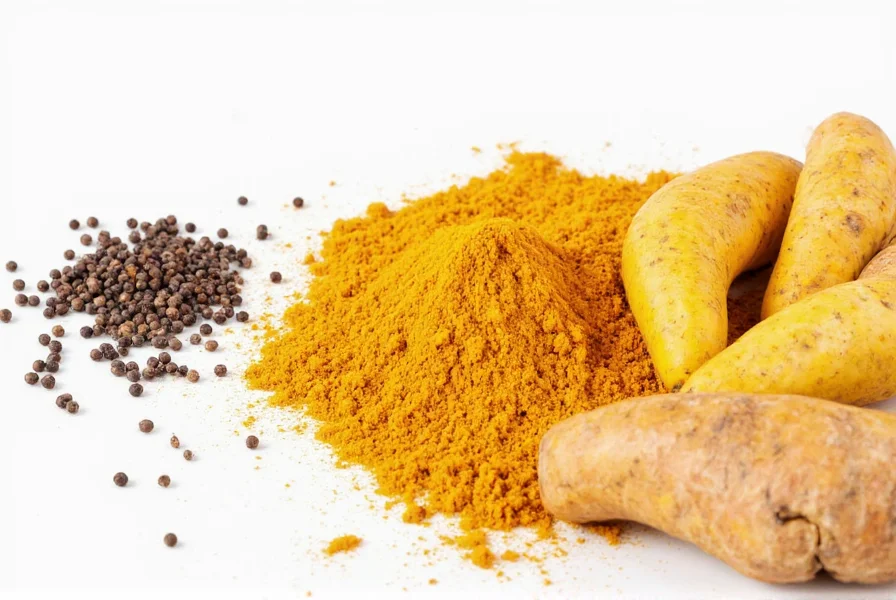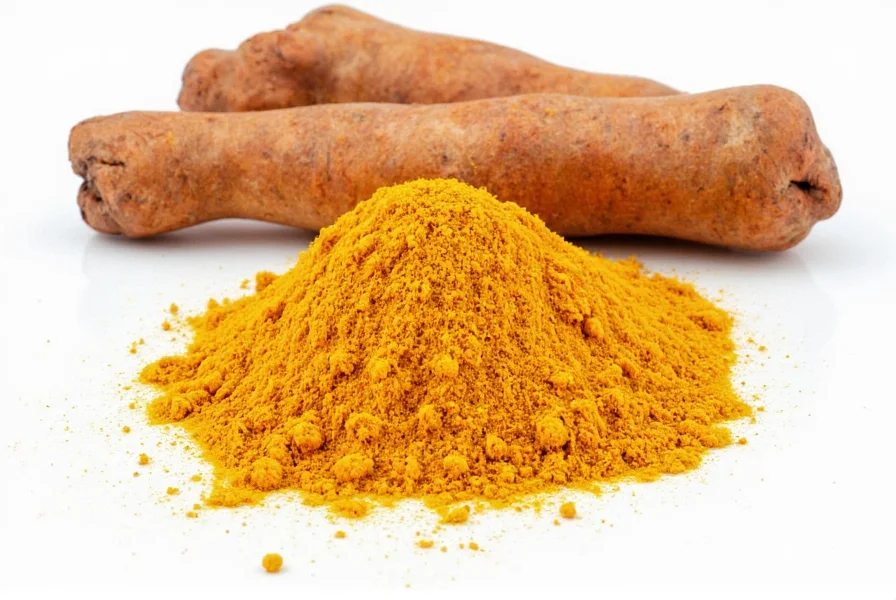Curcumin, the primary active compound in turmeric, has gained significant attention for its potential health benefits. However, its therapeutic potential is limited by poor bioavailability when consumed alone. This is where black pepper enters the equation as a powerful enhancer.
The Science Behind Curcumin's Bioavailability Challenge
Curcumin faces three major obstacles in the human body: limited absorption in the gut, rapid metabolism in the liver and intestinal wall, and quick systemic elimination. Studies show that when consumed alone, curcumin has extremely low blood concentration levels, making it difficult to achieve therapeutic effects.
Research published in Planta Medica demonstrated that a standard dose of 2 grams of curcumin alone resulted in undetectable or minimal levels in the bloodstream. This bioavailability issue has been a significant challenge for researchers studying curcumin's potential health applications.
How Black Pepper Transforms Curcumin Absorption
Black pepper contains piperine, an alkaloid responsible for its pungent taste. Piperine works through multiple mechanisms to enhance curcumin absorption:
- Inhibits glucuronidation in the liver and intestinal wall, slowing curcumin metabolism
- Increases intestinal absorption by affecting membrane dynamics
- Slows the rate at which curcumin is eliminated from the body
| Study | Curcumin Dose | With Piperine | Bioavailability Increase |
|---|---|---|---|
| Shoba et al. (1998) | 2,000 mg | 20 mg | 2,000% |
| Wang et al. (2021) | 500 mg | 5 mg | 154% |
| Antony et al. (2001) | 2,000 mg | 20 mg | 1,920% |
The landmark 1998 study by Shoba et al. published in Planta Medica demonstrated that adding just 20 mg of piperine to 2,000 mg of curcumin increased bioavailability by a remarkable 2,000%. This finding has been replicated in multiple subsequent studies, establishing piperine as one of the most effective natural bioavailability enhancers for curcumin.
Practical Applications and Considerations
When selecting turmeric curcumin supplements with black pepper, several factors matter for optimal results:
The most effective turmeric curcumin black pepper combinations typically maintain a ratio of approximately 100:1 (curcumin to piperine). For example, a supplement containing 500 mg of curcumin would ideally include 5 mg of piperine. This ratio aligns with the proportions used in successful clinical studies.
Timing also plays a role in maximizing absorption. Consuming curcumin with black pepper alongside healthy fats can further enhance absorption, as curcumin is fat-soluble. Many nutrition experts recommend taking these supplements with meals containing some fat content.
Current Research on Health Benefits
While research continues to evolve, studies suggest that the enhanced bioavailability from adding black pepper may improve potential benefits in several areas:
- Inflammation management: The improved curcumin levels may support the body's natural inflammatory response
- Joint health: Some clinical trials show promising results for joint comfort when using enhanced curcumin formulations
- Antioxidant support: Higher blood concentrations of curcumin provide greater antioxidant activity
It's important to note that while laboratory and animal studies show promising results, human clinical evidence varies in strength. The National Institutes of Health states that "curcumin research shows potential but more high-quality human studies are needed to confirm many health claims."
Safety and Considerations
Turmeric curcumin with black pepper is generally well-tolerated at recommended doses. However, certain considerations apply:
- Piperine may affect how the body processes certain medications by inhibiting specific enzymes
- Individuals taking blood thinners, diabetes medications, or certain other pharmaceuticals should consult healthcare providers
- Pregnant or breastfeeding women should exercise caution and seek medical advice
- High doses may cause mild digestive discomfort in some individuals
Most clinical studies use doses of 500-2,000 mg of curcumin daily, typically divided into multiple doses. The addition of piperine allows for lower effective doses of curcumin to achieve similar blood concentrations.
Choosing Quality Supplements
When evaluating turmeric curcumin supplements with black pepper, look for these quality indicators:
- Certified curcumin content (typically 95% curcuminoids)
- Standardized piperine content (usually 95% piperine)
- Third-party testing for purity and potency
- Transparent labeling of exact amounts
- Reputable manufacturers following good manufacturing practices
Be wary of products making exaggerated health claims or promising miraculous results. Legitimate supplements will provide clear information about ingredients and avoid making disease treatment claims that aren't supported by regulatory agencies.

Conclusion
The combination of turmeric curcumin with black pepper represents a scientifically supported approach to overcoming curcumin's natural bioavailability limitations. The addition of piperine significantly enhances curcumin absorption, potentially making its benefits more accessible. While research continues to evolve, current evidence supports this combination as an effective strategy for those seeking to maximize the potential benefits of curcumin supplementation.
As with any supplement, individual results may vary, and it's advisable to consult with healthcare professionals, particularly if you have underlying health conditions or take medications. The most effective approach combines quality supplementation with a balanced diet and healthy lifestyle practices.
How much black pepper should be taken with curcumin for optimal absorption?
Research indicates that a ratio of approximately 100:1 (curcumin to piperine) provides optimal enhancement. For every 100 mg of curcumin, about 1 mg of piperine (the active compound in black pepper) is recommended. Most effective supplements contain 5-20 mg of piperine alongside 500-2,000 mg of curcumin.
Can I get the same benefits by adding regular black pepper to turmeric in cooking?
While adding black pepper to turmeric in cooking does enhance curcumin absorption to some degree, the effect is significantly less than with standardized supplements. Culinary black pepper contains only about 5-9% piperine, and the amount typically used in cooking is insufficient to achieve the 2,000% bioavailability increase demonstrated in clinical studies. Supplements provide standardized, concentrated piperine for maximum effect.
How long does it take to notice benefits from turmeric curcumin with black pepper?
The timeframe for noticing potential benefits varies by individual and the specific health concern. Some people report improvements in joint comfort within 2-4 weeks of consistent use, while other benefits may take 8-12 weeks to become apparent. Research suggests that consistent daily use is necessary as curcumin's effects are cumulative. Blood concentration studies show peak levels occur 1-2 hours after ingestion, but therapeutic effects require sustained levels over time.
Are there any medications that shouldn't be taken with turmeric curcumin and black pepper?
Yes, piperine can affect how the body metabolizes certain medications by inhibiting cytochrome P450 enzymes and P-glycoprotein. This includes blood thinners (like warfarin), diabetes medications, certain antidepressants, and some chemotherapy drugs. If you take prescription medications, consult your healthcare provider before starting turmeric curcumin with black pepper supplements to avoid potential interactions.
Is turmeric curcumin with black pepper safe for long-term use?
Current research suggests that turmeric curcumin with black pepper is generally safe for long-term use at recommended doses. Most clinical studies have examined use for 6-12 months with good safety profiles. However, extremely high doses over extended periods may potentially cause digestive issues in some individuals. As with any supplement, periodic evaluation with a healthcare provider is recommended for ongoing use.











 浙公网安备
33010002000092号
浙公网安备
33010002000092号 浙B2-20120091-4
浙B2-20120091-4